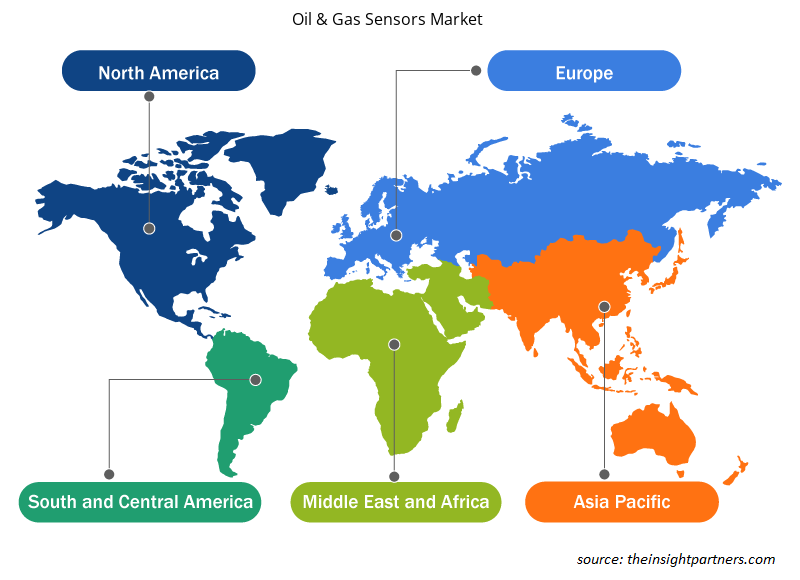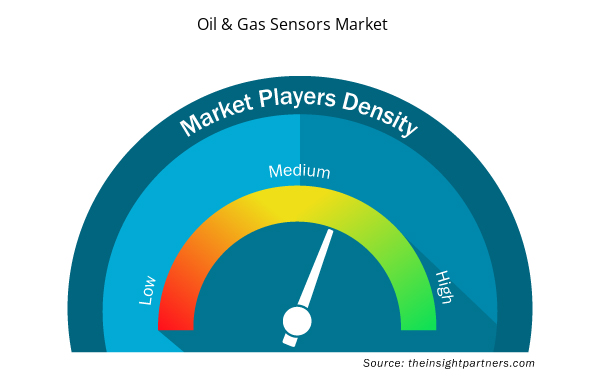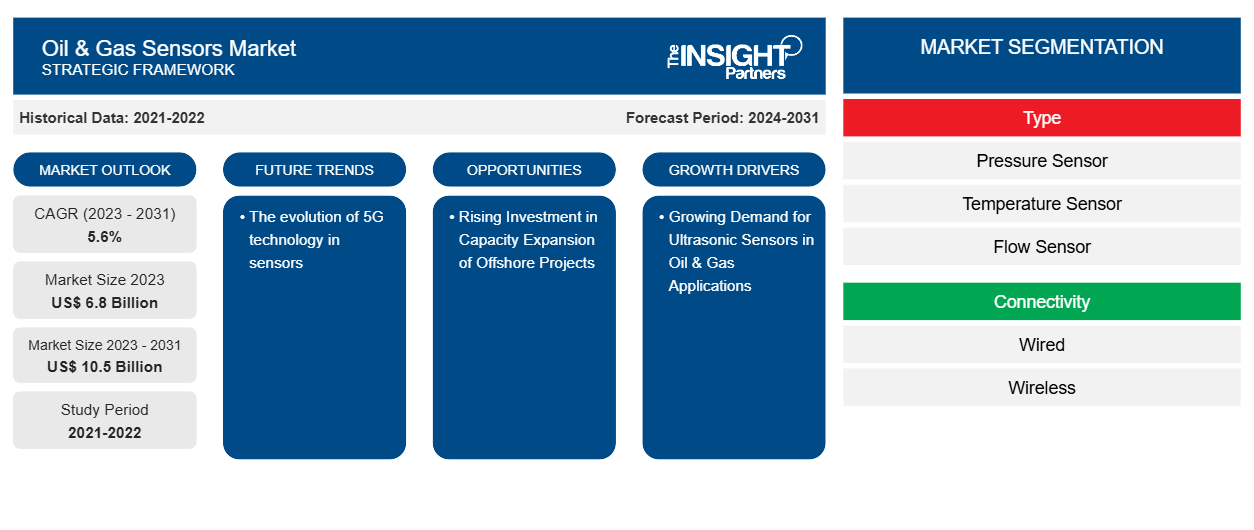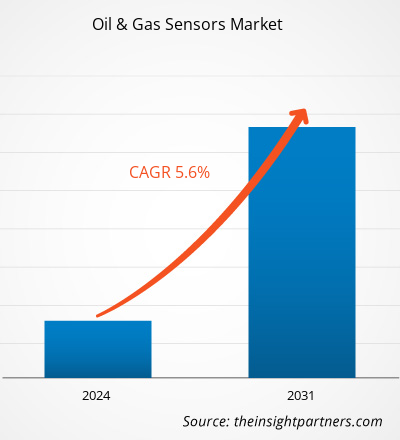من المتوقع أن يصل حجم سوق أجهزة استشعار النفط والغاز إلى 10.5 مليار دولار أمريكي بحلول عام 2031 من 6.8 مليار دولار أمريكي في عام 2023. ومن المتوقع أن يسجل السوق معدل نمو سنوي مركب بنسبة 5.6٪ من عام 2023 إلى عام 2031. ومن المرجح أن يظل تطور تقنية 5G في أجهزة الاستشعار اتجاهًا رئيسيًا في السوق.
تحليل سوق أجهزة استشعار النفط والغاز
لقد وجدت أجهزة استشعار النفط والغاز تطبيقات مختلفة في المنبع والمنتصف والمصب، بما في ذلك تحسين أداء خطوط الأنابيب، وقياس التدفق، واكتشاف التسريبات، ومنع الحوادث المحتملة أو المخاطر البيئية من خلال ضمان سلامة العمال. إن الطلب المتزايد على الموثوقية والكفاءة التشغيلية، والحاجة المتزايدة للكشف المبكر عن المخاطر المحتملة، وزيادة الأتمتة الصناعية، والمبادرات الحكومية المواتية تعمل على دفع سوق أجهزة استشعار النفط والغاز . علاوة على ذلك، فإن صناعة النفط والغاز المتوسعة والحاجة المتزايدة لمراقبة مصانع النفط والغاز في الوقت الفعلي تعمل على تعزيز نمو السوق. يساهم التقدم التكنولوجي ودمج التقنيات المتطورة مثل الذكاء الاصطناعي وإنترنت الأشياء في تطوير أجهزة الاستشعار المتقدمة بشكل كبير في نمو سوق أجهزة استشعار النفط والغاز.
نظرة عامة على سوق أجهزة استشعار النفط والغاز
تكتشف أجهزة الاستشعار وتقيس التغيرات المادية المدخلة في البيئة وتحولها إلى مخرجات يمكن قراءتها بسهولة بواسطة الإنسان أو الآلة. يحول المستشعر الظاهرة الفيزيائية إلى جهد تناظري قابل للقياس أو إشارة رقمية يتم عرضها أو إرسالها لمزيد من المعالجة. تستخدم الصناعات مثل النفط والغاز أجهزة الاستشعار لمراقبة درجة الحرارة وقياس المسافة وضبط الضغط واكتشاف الدخان، من بين أمور أخرى. تعتمد صناعة النفط والغاز بشكل كبير على أجهزة الاستشعار للمراقبة المستمرة وقياس عمل مصانع النفط والغاز من خلال تجنب الانقطاعات غير المجدولة وصيانة الآلات. يمكن لأجهزة استشعار النفط والغاز تحمل درجات حرارة عالية للغاية أو بيئات خطرة وهي مقاومة للانفجار / آمنة جوهريًا ومقاومة للتآكل ومقاومة للماء / قابلة للغمر ومقاومة للغبار (مصنفة IP). تدعم هذه الميزات صناعة النفط والغاز لمراقبة الآبار وخطوط الأنابيب والتطبيقات تحت سطح البحر وأجهزة رأس البئر ومرجع الدفة وخزانات التخزين وآبار النفط بدقة.
قم بتخصيص هذا التقرير ليناسب متطلباتك
ستحصل على تخصيص لأي تقرير - مجانًا - بما في ذلك أجزاء من هذا التقرير، أو تحليل على مستوى الدولة، وحزمة بيانات Excel، بالإضافة إلى الاستفادة من العروض والخصومات الرائعة للشركات الناشئة والجامعات
- احصل على أهم اتجاهات السوق الرئيسية لهذا التقرير.ستتضمن هذه العينة المجانية تحليلاً للبيانات، بدءًا من اتجاهات السوق وحتى التقديرات والتوقعات.
محركات وفرص سوق أجهزة استشعار النفط والغاز
الطلب المتزايد على أجهزة الاستشعار بالموجات فوق الصوتية في تطبيقات النفط والغاز
تكتسب أعمال النفط والغاز أهمية متزايدة مع سعي البلدان إلى مصادر بديلة للطاقة المتجددة الخالية من الكربون. ومع ذلك، أدى الطلب المتزايد على النفط والغاز إلى إنتاج مرتفع من البنية التحتية القائمة التي يجب أن تكون أكثر موثوقية وكفاءة. لتلبية هذه المطالب، تقدم شركات أجهزة استشعار النفط والغاز، مثل Fuji Electric Co Ltd وHoneywell International Inc وSiemens AG وMurata Manufacturing Co Ltd، أجهزة استشعار بالموجات فوق الصوتية لقياس السوائل في ظروف عملية شديدة ومعقدة. تُستخدم هذه المستشعرات على نطاق واسع للمراقبة عن بعد ومراقبة الحالة والصيانة والتحليل والمحاكاة والتحكم في التدفق في تطبيقات النفط والغاز المختلفة. يتم استخدام مستشعر التدفق بالموجات فوق الصوتية في التطبيقات السابقة والوسطى والمصب لحساب تدفق الكتلة أو تدفق الحجم للسوائل في خطوط الأنابيب والخزانات ومعدات المعالجة الأخرى. يراقب المستشعر أيضًا المعدات مثل مضخات المراقبة وخطوط التدفق والصمامات وأي مكون آخر يتطلب معدل تدفق دقيقًا للحفاظ على تدفق النفط. علاوة على ذلك، فإن الطلب المتزايد على القياسات غير التطفلية في تطبيقات النفط والغاز في المصب وفي منتصف الطريق يؤدي إلى زيادة الحاجة إلى أجهزة استشعار بالموجات فوق الصوتية لمراقبة أحجام السوائل أثناء التفاعلات الكيميائية المختلفة في عمليات التكرير والتنقية. تراقب هذه المستشعرات تدفق السوائل بدقة دون مقاطعة العمليات الجارية.
ارتفاع الاستثمار في توسيع قدرات المشاريع البحرية
تتمتع مصادر الطاقة المتجددة البحرية، مثل طاقة الرياح البحرية وطاقة المحيطات، بالقدرة على تسريع التحول العالمي في مجال الطاقة مع خلق فرص اقتصادية واجتماعية جديدة. ووفقًا لأحدث البيانات التي نشرتها الوكالة الدولية للطاقة المتجددة (IRENA) في يونيو 2023، بلغت سعة طاقة الرياح البحرية أكثر من 55 جيجاوات في عام 2022، بينما بلغت سعة طاقة المحيطات المركبة 0.535 جيجاوات في عام 2021. ومن المتوقع بحلول عام 2030 أن تولد طاقة الرياح البحرية وطاقة المحيطات 380 جيجاوات و350 جيجاوات على التوالي، وذلك بسبب زيادة الاستثمار في تقنيات طاقة المحيطات. وهذا يعزز اعتماد أجهزة استشعار النفط والغاز بين المستخدمين لمراقبة جودة المياه، واكتشاف الانسكابات النفطية، وتقييم تأثير أنشطة الحفر البحرية على تطبيقات النفط والغاز.
تقرير تحليل تجزئة سوق أجهزة استشعار النفط والغاز
إن القطاعات الرئيسية التي ساهمت في اشتقاق تحليل سوق أجهزة استشعار النفط والغاز هي النوع والاتصال والوظيفة والتطبيق.
- بناءً على النوع، يتم تقسيم سوق أجهزة استشعار النفط والغاز إلى مستشعر الضغط ومستشعر درجة الحرارة ومستشعر التدفق ومستشعر المستوى. احتلت شريحة مستشعر الضغط أكبر حصة في السوق في عام 2023.
- بناءً على الاتصال، يتم تقسيم سوق أجهزة استشعار النفط والغاز إلى سلكية ولاسلكية. سيطر القطاع السلكي على السوق في عام 2023.
- من حيث الوظيفة، يتم تقسيم السوق إلى المراقبة عن بعد، ومراقبة الحالة والصيانة، والتحليل والمحاكاة، وغيرها. هيمن قطاع المراقبة عن بعد على السوق في عام 2023.
- من حيث التطبيق، يتم تقسيم سوق أجهزة استشعار النفط والغاز إلى المنبع والمنتصف والمصب. احتلت شريحة المنبع الحصة الأكبر في السوق في عام 2023.
تحليل حصة سوق أجهزة استشعار النفط والغاز حسب المنطقة الجغرافية
تم تقسيم سوق أجهزة استشعار النفط والغاز إلى خمس مناطق رئيسية - أمريكا الشمالية وأوروبا وآسيا والمحيط الهادئ (APAC) والشرق الأوسط وأفريقيا (MEA) وأمريكا الجنوبية والوسطى. سيطرت أمريكا الشمالية على السوق في عام 2023، تليها أوروبا ومنطقة آسيا والمحيط الهادئ.
يعود نمو سوق أجهزة استشعار النفط والغاز في أمريكا الشمالية إلى التبني المتزايد لأجهزة استشعار النفط والغاز في التطبيقات السابقة والوسطى واللاحقة، من بين أمور أخرى، لمراقبة عمل الأجهزة والمعدات المستخدمة في قطاع الطاقة والكهرباء. علاوة على ذلك، من المتوقع أن تخلق أنشطة التوسع في صناعات النفط والغاز فرصًا مربحة لنمو السوق خلال الفترة المتوقعة.
أجهزة استشعار النفط والغاز
رؤى إقليمية حول سوق أجهزة استشعار النفط والغاز
لقد قام المحللون في Insight Partners بشرح الاتجاهات والعوامل الإقليمية المؤثرة على سوق أجهزة استشعار النفط والغاز طوال فترة التوقعات بشكل شامل. يناقش هذا القسم أيضًا قطاعات سوق أجهزة استشعار النفط والغاز والجغرافيا في جميع أنحاء أمريكا الشمالية وأوروبا ومنطقة آسيا والمحيط الهادئ والشرق الأوسط وأفريقيا وأمريكا الجنوبية والوسطى.

- احصل على البيانات الإقليمية المحددة لسوق أجهزة استشعار النفط والغاز
نطاق تقرير سوق أجهزة استشعار النفط والغاز
| سمة التقرير | تفاصيل |
|---|---|
| حجم السوق في عام 2023 | 6.8 مليار دولار أمريكي |
| حجم السوق بحلول عام 2031 | 10.5 مليار دولار أمريكي |
| معدل النمو السنوي المركب العالمي (2023 - 2031) | 5.6% |
| البيانات التاريخية | 2021-2022 |
| فترة التنبؤ | 2024-2031 |
| القطاعات المغطاة | حسب النوع
|
| المناطق والدول المغطاة | أمريكا الشمالية
|
| قادة السوق وملفات تعريف الشركات الرئيسية |
|
كثافة اللاعبين في سوق أجهزة استشعار النفط والغاز: فهم تأثيرها على ديناميكيات الأعمال
يشهد سوق أجهزة استشعار النفط والغاز نموًا سريعًا، مدفوعًا بالطلب المتزايد من المستخدم النهائي بسبب عوامل مثل تفضيلات المستهلكين المتطورة والتقدم التكنولوجي والوعي المتزايد بفوائد المنتج. ومع ارتفاع الطلب، تعمل الشركات على توسيع عروضها والابتكار لتلبية احتياجات المستهلكين والاستفادة من الاتجاهات الناشئة، مما يؤدي إلى زيادة نمو السوق.
تشير كثافة اللاعبين في السوق إلى توزيع الشركات أو المؤسسات العاملة في سوق أو صناعة معينة. وهي تشير إلى عدد المنافسين (اللاعبين في السوق) الموجودين في مساحة سوق معينة نسبة إلى حجمها أو قيمتها السوقية الإجمالية.
الشركات الرئيسية العاملة في سوق أجهزة استشعار النفط والغاز هي:
- شركة هونيويل الدولية
- شركة تي إي للاتصالات المحدودة
- شركة روبرت بوش المحدودة
- شركة أيه بي بي المحدودة
- شركة سيمنز ايه جي
- شركة روكويل للأتمتة
إخلاء المسؤولية : الشركات المذكورة أعلاه ليست مرتبة بأي ترتيب معين.

- احصل على نظرة عامة على أهم اللاعبين الرئيسيين في سوق أجهزة استشعار النفط والغاز
أخبار وتطورات سوق أجهزة استشعار النفط والغاز
يتم تقييم سوق أجهزة استشعار النفط والغاز من خلال جمع البيانات النوعية والكمية بعد البحث الأولي والثانوي، والتي تتضمن منشورات الشركات المهمة وبيانات الجمعيات وقواعد البيانات. فيما يلي بعض التطورات في سوق أجهزة استشعار النفط والغاز:
- أعلنت شركة نيفادا نانو، وهي شركة مبتكرة في مجال الحلول البيئية والاجتماعية والحوكمة، أنها أغلقت جولتها التمويلية من الفئة C. وقادت الجولة المستثمرون الجدد هانيويل فينتشرز وإيمرسون فينتشرز، وانضم إليهم العديد من المستثمرين الحاليين. (المصدر: نيفادا نانو، بيان صحفي، نوفمبر 2023)
- أطلقت شركة ABB جهاز الاستشعار الذكي الجديد FusionAir، وهو جهاز استشعار للغرفة يعمل بدون لمس مع أجهزة استشعار اختيارية للتحكم في الغرفة قادرة على مراقبة درجة الحرارة والرطوبة وثاني أكسيد الكربون (CO2) والمركبات العضوية المتطايرة لتحسين جودة الهواء الداخلي بشكل عام وتقليل خطر التعرض للفيروسات. (المصدر: ABB Ltd، بيان صحفي، أكتوبر 2021)
تقرير سوق أجهزة استشعار النفط والغاز والتغطية والنتائج المتوقعة
يوفر "حجم سوق أجهزة استشعار النفط والغاز والتوقعات (2021-2031)" تحليلاً مفصلاً للسوق يغطي المجالات المذكورة أدناه:
- حجم سوق أجهزة استشعار النفط والغاز وتوقعاته على المستويات العالمية والإقليمية والوطنية لجميع قطاعات السوق الرئيسية التي يغطيها النطاق
- اتجاهات سوق أجهزة استشعار النفط والغاز بالإضافة إلى ديناميكيات السوق مثل العوامل المحركة والقيود والفرص الرئيسية
- تحليل مفصل لقوى PEST/Porter الخمس وSWOT
- تحليل سوق أجهزة استشعار النفط والغاز الذي يغطي اتجاهات السوق الرئيسية والإطار العالمي والإقليمي واللاعبين الرئيسيين واللوائح والتطورات الأخيرة في السوق
- تحليل المشهد الصناعي والمنافسة الذي يغطي تركيز السوق، وتحليل خريطة الحرارة، واللاعبين البارزين، والتطورات الأخيرة لسوق أجهزة استشعار النفط والغاز
- ملفات تعريف الشركة التفصيلية
- التحليل التاريخي (سنتان)، السنة الأساسية، التوقعات (7 سنوات) مع معدل النمو السنوي المركب
- تحليل PEST و SWOT
- حجم السوق والقيمة / الحجم - عالميًا وإقليميًا وقطريًا
- الصناعة والمنافسة
- مجموعة بيانات Excel



Report Coverage
Revenue forecast, Company Analysis, Industry landscape, Growth factors, and Trends

Segment Covered
This text is related
to segments covered.

Regional Scope
North America, Europe, Asia Pacific, Middle East & Africa, South & Central America

Country Scope
This text is related
to country scope.
الأسئلة الشائعة
North America dominated the oil & gas sensors market in 2023.
The growing demand for ultrasonic sensors in oil & gas applications is the major factors that propel the market growth.
Evolution of 5G technology in sensors to play a significant role in the oil & gas sensors market in the coming years.
The key players holding majority shares in the global oil & gas sensors market are Honeywell International Inc, TE Connectivity Ltd, Robert Bosch GmbH, ABB Ltd, Siemens AG, Rockwell Automation Inc, Analog Devices Inc, Emerson Electric Co, SKF AB, and GE Vernova.
The oil & gas sensors market is anticipated to reach US$ 10.5 billion by 2031.
The oil & gas sensors market is estimated to record a CAGR of 5.6% from 2023 to 2031.
Trends and growth analysis reports related to Electronics and Semiconductor : READ MORE..
The List of Companies - Oil and Gas Sensors Market
- Honeywell International Inc
- TE Connectivity Ltd
- Robert Bosch GmbH
- ABB Ltd
- Siemens AG
- Rockwell Automation Inc
- Analog Devices Inc
- Emerson Electric Co
- SKF AB
- GE Vernova
The Insight Partners performs research in 4 major stages: Data Collection & Secondary Research, Primary Research, Data Analysis and Data Triangulation & Final Review.
- Data Collection and Secondary Research:
As a market research and consulting firm operating from a decade, we have published and advised several client across the globe. First step for any study will start with an assessment of currently available data and insights from existing reports. Further, historical and current market information is collected from Investor Presentations, Annual Reports, SEC Filings, etc., and other information related to company’s performance and market positioning are gathered from Paid Databases (Factiva, Hoovers, and Reuters) and various other publications available in public domain.
Several associations trade associates, technical forums, institutes, societies and organization are accessed to gain technical as well as market related insights through their publications such as research papers, blogs and press releases related to the studies are referred to get cues about the market. Further, white papers, journals, magazines, and other news articles published in last 3 years are scrutinized and analyzed to understand the current market trends.
- Primary Research:
The primarily interview analysis comprise of data obtained from industry participants interview and answers to survey questions gathered by in-house primary team.
For primary research, interviews are conducted with industry experts/CEOs/Marketing Managers/VPs/Subject Matter Experts from both demand and supply side to get a 360-degree view of the market. The primary team conducts several interviews based on the complexity of the markets to understand the various market trends and dynamics which makes research more credible and precise.
A typical research interview fulfils the following functions:
- Provides first-hand information on the market size, market trends, growth trends, competitive landscape, and outlook
- Validates and strengthens in-house secondary research findings
- Develops the analysis team’s expertise and market understanding
Primary research involves email interactions and telephone interviews for each market, category, segment, and sub-segment across geographies. The participants who typically take part in such a process include, but are not limited to:
- Industry participants: VPs, business development managers, market intelligence managers and national sales managers
- Outside experts: Valuation experts, research analysts and key opinion leaders specializing in the electronics and semiconductor industry.
Below is the breakup of our primary respondents by company, designation, and region:

Once we receive the confirmation from primary research sources or primary respondents, we finalize the base year market estimation and forecast the data as per the macroeconomic and microeconomic factors assessed during data collection.
- Data Analysis:
Once data is validated through both secondary as well as primary respondents, we finalize the market estimations by hypothesis formulation and factor analysis at regional and country level.
- Macro-Economic Factor Analysis:
We analyse macroeconomic indicators such the gross domestic product (GDP), increase in the demand for goods and services across industries, technological advancement, regional economic growth, governmental policies, the influence of COVID-19, PEST analysis, and other aspects. This analysis aids in setting benchmarks for various nations/regions and approximating market splits. Additionally, the general trend of the aforementioned components aid in determining the market's development possibilities.
- Country Level Data:
Various factors that are especially aligned to the country are taken into account to determine the market size for a certain area and country, including the presence of vendors, such as headquarters and offices, the country's GDP, demand patterns, and industry growth. To comprehend the market dynamics for the nation, a number of growth variables, inhibitors, application areas, and current market trends are researched. The aforementioned elements aid in determining the country's overall market's growth potential.
- Company Profile:
The “Table of Contents” is formulated by listing and analyzing more than 25 - 30 companies operating in the market ecosystem across geographies. However, we profile only 10 companies as a standard practice in our syndicate reports. These 10 companies comprise leading, emerging, and regional players. Nonetheless, our analysis is not restricted to the 10 listed companies, we also analyze other companies present in the market to develop a holistic view and understand the prevailing trends. The “Company Profiles” section in the report covers key facts, business description, products & services, financial information, SWOT analysis, and key developments. The financial information presented is extracted from the annual reports and official documents of the publicly listed companies. Upon collecting the information for the sections of respective companies, we verify them via various primary sources and then compile the data in respective company profiles. The company level information helps us in deriving the base number as well as in forecasting the market size.
- Developing Base Number:
Aggregation of sales statistics (2020-2022) and macro-economic factor, and other secondary and primary research insights are utilized to arrive at base number and related market shares for 2022. The data gaps are identified in this step and relevant market data is analyzed, collected from paid primary interviews or databases. On finalizing the base year market size, forecasts are developed on the basis of macro-economic, industry and market growth factors and company level analysis.
- Data Triangulation and Final Review:
The market findings and base year market size calculations are validated from supply as well as demand side. Demand side validations are based on macro-economic factor analysis and benchmarks for respective regions and countries. In case of supply side validations, revenues of major companies are estimated (in case not available) based on industry benchmark, approximate number of employees, product portfolio, and primary interviews revenues are gathered. Further revenue from target product/service segment is assessed to avoid overshooting of market statistics. In case of heavy deviations between supply and demand side values, all thes steps are repeated to achieve synchronization.
We follow an iterative model, wherein we share our research findings with Subject Matter Experts (SME’s) and Key Opinion Leaders (KOLs) until consensus view of the market is not formulated – this model negates any drastic deviation in the opinions of experts. Only validated and universally acceptable research findings are quoted in our reports.
We have important check points that we use to validate our research findings – which we call – data triangulation, where we validate the information, we generate from secondary sources with primary interviews and then we re-validate with our internal data bases and Subject matter experts. This comprehensive model enables us to deliver high quality, reliable data in shortest possible time.


 احصل على عينة مجانية لهذا التقرير
احصل على عينة مجانية لهذا التقرير